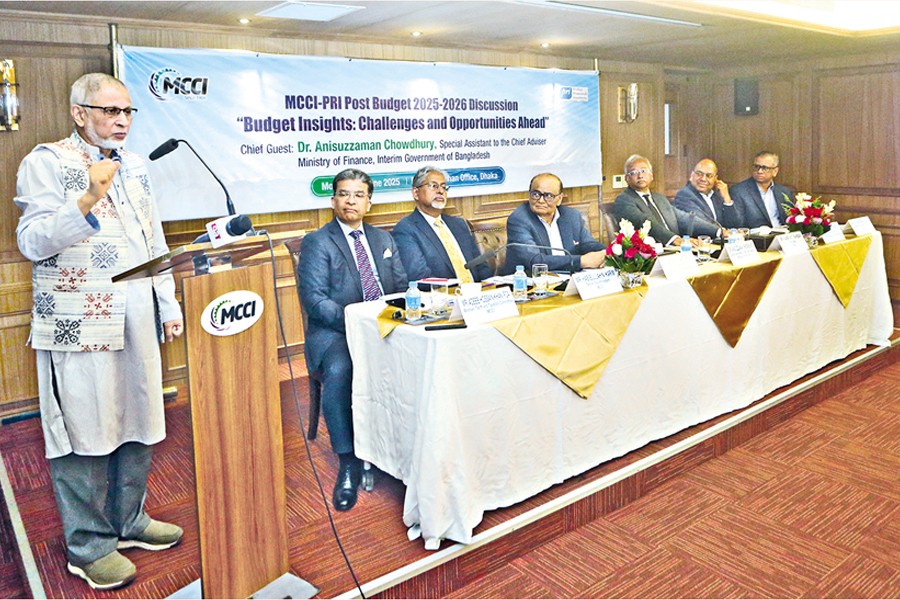
Published :
Updated :

Bangladesh's chronic revenue shortfall and lack of tax compliance are at the heart of its fiscal and developmental challenges, said Anisuzzaman Chowdhury, special assistant to the chief adviser of the interim government, on Monday.
He made the observation at a post-budget discussion organised by the Metropolitan Chamber of Commerce and Industry (MCCI) in Dhaka. The event was a joint collaboration between MCCI and Policy Research Institute (PRI).
"The crux of the problem is we have a very low revenue. Our tax-to-GDP ratio is so low; it's really ridiculous," he said. "You simply cannot do anything with the little budget we have."
He pointed out that questions about inadequate spending on health, education or rising fiscal deficits cannot be addressed without first acknowledging the fundamental issue of revenue mobilisation.
"Before we ask why the government isn't doing something, we have to look inward. As citizens, we generally do not feel we have an obligation to pay taxes," he said.
He called for a shift in public mentality and greater awareness of citizens' responsibilities alongside their rights.
Mr Chowdhury also addressed the overreliance on tariffs, saying, "Tariff is the easiest way to collect tax. It's cashable and passes the burden on."
He welcomed criticism of supplementary duties and para-tariffs but noted that these have become default tools due to the state's inability to expand direct taxation.
He warned against the persistent culture of seeking tax exemptions and protection. "We've gotten used to being protected all the time, asking for exemptions. It has become a habit," he said.
Turning to structural issues, Mr Chowdhury said the country's biggest economic management problems stem from weak policy coordination, lack of coherence, and ad-hocism.
"One department creates a path, another department cuts it off. That's our coordination," he remarked, adding that 'coherence is entirely missing' across macroeconomic policy, whether in inflation control, capital market planning, or SME development.
He noted that while individual institutions like Bangladesh Bank have researchers, "they're all working in silos" without cross-ministerial collaboration or integration. "This is the responsibility of the Planning Commission," he asserted.
Mr Chowdhury also criticised the absence of implementation monitoring, saying: "This is missing in our overall economic management. I'm not blaming any particular government -- this has been the reality."
He also lamented the absence of a long-term economic vision in the country's policymaking. "We don't have a vision," he said, citing examples of countries like South Korea, China, and Japan that overcame crises with long-term planning and national resolve.
PRI Chairman Dr Zaidi Sattar and its Research Director, Dr Bazlul Haque Khondker presented a paper titled "Budget 2025-26: Could We Balance Stability with Equity?"
In the paper, they said Bangladesh must urgently enhance its competitiveness and productivity to drive economic diversification, employment growth, and macroeconomic stability.
The paper underscores the need for structural reforms in tax policy and administration to offset revenue losses from necessary tariff reductions.
It warns that the projected 33 per cent revenue growth for FY26 is overly ambitious, given recent trends of only 10 per cent in FY23 and 12 per cent in FY24, and an estimated 4.0 per cent growth in the current fiscal year.
The economists noted that budget deficits and reliance on bank borrowing and central bank money printing have surged in recent years, fuelling inflation and eroding macroeconomic stability.
Interest costs from excessive use of T-bills are also crowding out private credit, they added. They recommended capping domestic bank financing at 1 per cent of GDP and shifting towards increased foreign borrowing.
Subsidy reforms were another key focus, with calls to eliminate export and remittance subsidies, which are now redundant under a market-based exchange rate regime. "These subsidies are draining budgetary resources without offering clear benefits," the paper stated.
The paper noted that redistributive efforts remain weak, with stagnant allocations in health, education, and social protection -- a missed opportunity for equity-focused growth.
While the budget's smaller size signals a shift toward fiscal realism and stabilisation amid inflationary pressures, the authors criticised the lack of a structural shift in tax policy.
"The continued reliance on indirect and trade taxes keeps the system regressive, disproportionately affecting lower-income groups and discouraging private investment," the paper said.
MCCI President Kamran T Rahman expressed concern over increase in turnover tax from 0.6 per cent to as high as 1 per cent across almost all sectors.
"We contend that this shift is inconsistent with sound tax policy principles, particularly those focused on encouraging formalisation and lowering business costs," he said.
He said such a measure risks penalising compliant taxpayers, especially SMEs and low-margin businesses, and may hinder overall business growth and investment confidence.
MCCI urged the government to reconsider and review this provision in consultation with the private sector, to ensure that the tax structure remains growth-friendly and equitable.
bdsmile@gmail.com


 For all latest news, follow The Financial Express Google News channel.
For all latest news, follow The Financial Express Google News channel.